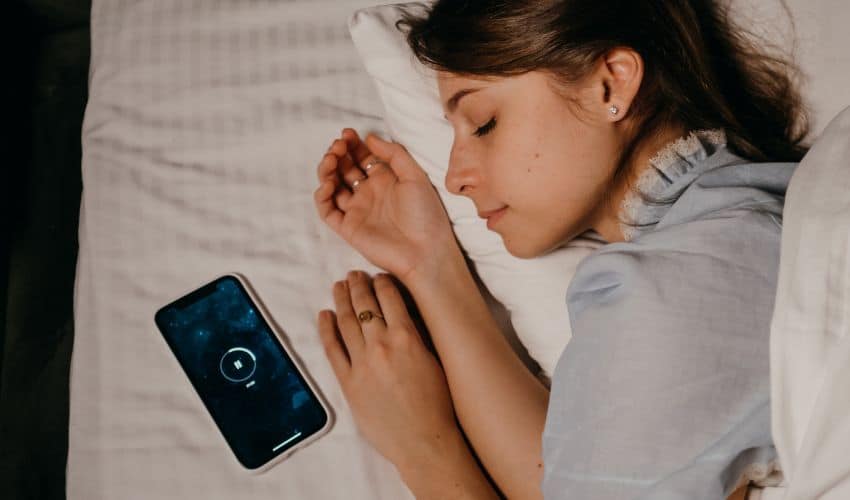Our quality of life depends on sleep. While we sleep, body and mind undergo a number of processes that are vital for our health and optimal functioning. Not getting enough sleep is not just inconvenient, it puts us at risk for serious health complications. When we find it difficult to fall asleep at night, sleep meditation can help.
During sleep, the brain organizes information and stores it in memory for future use. Sleep is an important part of the learning process and contributes to brain plasticity. Sleep is also vital for clearing out cellular waste. While we sleep, hormones and proteins are released, which repair and rejuvenate nerve cells.
When we don’t get enough sleep, both the body and mind are affected. Our memory and ability to learn things decline and we’re more likely to experience depression and anxiety. Lack of sleep compromises our immunity, increasing the risk of illness and infection. Long-term sleep loss leads to metabolic syndrome, a collection of symptoms such as obesity, high blood pressure, high blood sugar, and poor cholesterol ratios, which put us at greater risk for diabetes, heart disease, and stroke.
If you’re having trouble sleeping, you’re not alone. In the United States, the Centers for Disease Control report that more than 1 in 3 adults are sleep deprived. Since lack of sleep so pervasively harms us, getting sufficient sleep is perhaps the single most important thing we can do to improve our quality of life and well-being.
Research points to meditation as a valuable tool for helping us fall asleep sooner and sleep better. Guided meditations, sleep music and sleep meditation scripts can all be used to improve our personal sleep quality, or to help us improve the sleep of others.

What is Sleep Meditation?
Sleep meditation is a meditation practice done just before bed, in which quieting the body and mind is the goal. Drifting off to sleep is perfectly welcome! Although we can meditate for sleep on our own, the practice is often guided. This allows us to further let go of all effort and simply relax.
Sleep meditation is practiced lying down, ideally in your bed, with the lights off as you’re ready to fall asleep. Sleep meditations employ a variety of techniques to help guide the mind away from movement into a quieter state of calm. Focusing on mantra, breath, body, or a visualization turns our attention away from doing, planning, worrying, or ruminating and allows the body and mind to settle into a state that’s conducive to sleep
What Causes Sleep Deprivation & Insomnia?
When we fail to get enough sleep or sufficient quality sleep, we become sleep deprived. Sleep deprivation may either be self-inflicted or the result of insomnia or another sleep disorder.
Insomnia results in sleep deprivation but is classified as a sleep disorder. Those with insomnia cannot fall asleep or stay asleep for long, despite doing their best to establish the proper causes and conditions for sleep. Many of those with insomnia have mental or physical health issues that contribute to their sleep disorder, such as the following:
Sleep deprivation can happen after one night of very little sleep or can accumulate slowly over time. Missing just 1-2 hours of sleep each night might not seem like a big deal, but it can still lead to negative consequences. Sleep deprivation that stems from personal lifestyle choice is generally related to one or more of the following:
Regardless of the cause of sleep deprivation, the results are the same. Daytime drowsiness negatively affects attention, learning, memory, mood, and hand to eye coordination. Over the long term, sleep deprivation worsens health conditions and quality of life.
Both sleep deprivation and sleep disorders such as insomnia improve with sleep meditation.
How Sleep Meditation Works
A consistent meditation practice (at any time of day) triggers physiological changes in the brain, which help regulate our sleep cycles. Sleep meditation works by changing the brain in the following ways:
Improves Mindfulness:
By strengthening our mindfulness of the present moment, just as it is, meditation helps reduce intrusive and ruminative thoughts. As emotional regulation improves, we become less likely to suppress thought or emotion and more capable of entertaining positive perspectives. Researchers have found these outcomes are directly related to both the quantity and quality of sleep.
Increases Melatonin:
Meditating just before bedtime can increase melatonin levels. In one study, those who practiced meditation had more melatonin in their blood at midnight than those who did not. Findings from additional studies suggest long-term meditators have more melatonin in their system than non-meditators. Studies such as these are just beginning to shed light on how meditation plays a role in regulating melatonin.
Decreases Cortisol:
Cortisol is ubiquitously known as the stress hormone. Studies find those who meditate have lower morning cortisol levels, a hormonal variance that’s correlated with better sleep. This effect is seen after just 8 weeks of mindfulness practice. However, it appears that long-term meditation practice down-regulates cortisol even further, indicating a dose-response relationship.
Balances the Nervous System:
To fall asleep and sleep soundly, our nervous system needs to be in a state of balance. Stress, anxiety, emotional dysregulation, and age are just some of the factors that favor sympathetic nervous system activity. When fight or flight mode is activated, we’re awake! Meditation shifts nervous system activity toward the parasympathetic system, promoting quality night-time sleep.
Sleep Meditation Techniques
Certain types of meditation are better suited for sleep than others. The type of meditation we choose may also depend on what keeps us up at night.
If intrusive thoughts, worry, or rumination are keeping us awake, meditations on the body and breath can help draw our attention away from activity in the head. Meditating on sensations in the body can also help address pain, restless leg syndrome, or breathing issues. Some of the most popular meditations for sleep are outlined below:
Mindfulness of Breath:
During breath awareness meditation, we place our attention on the breath. The breath is a convenient, ever-present anchor to which we can loosely tether our wandering mind. The natural rhythmic cycle of breathing can be soothing and calming, helping us drift off to sleep.
Body Scan:
Body scan meditation is commonly practiced lying down. In a body scan for sleep, we might focus on sensing where in the body we already feel calm and at ease. Techniques such as progressive relaxation, in which we squeeze and then release our muscles, can also promote relaxation.
Visualization:
Visualization-based meditations for sleep may guide us through stories in which we imagine ourselves in a dark, comfortable space. Visualization can also help us work with the body or breath, cueing us to imagine the body as warmth, light, or space.
Gratitude:
A gratitude practice can help calm the mind by bringing our attention to what’s positive in our lives. One classic practice is to review the events of our day with feelings of gratitude just before falling asleep. If nothing comes to mind, we can conjure gratitude for our breath, our heartbeat, the roof over our heads or our bed.
Compassion:
Heart-based meditations are not commonly associated with sleep. But research links compassion-based practices to improvements in sleep in part by reducing our feelings of loneliness. Loving-Kindness or the Just Like Me meditation are examples of such practices.
Counting or Mantra:
Just as the rhythm of our breath can lull us to sleep, so too can the rhythm of counting or repeating a mantra. Recommended mantras for sleep include, ‘ am safe,’ ‘I am content,’ or ‘I am at peace.’
Sleep Meditation Music:
Sleep meditation music is composed with particular attention to pace and tone. As the energy of our body resonates with the music, we may find ourselves becoming more relaxed.
Benefits of Sleep Meditation
Sleep more soundly, and everything changes. Adults who get the recommended 7-9 hours of nightly sleep experience better mood, memory, and attention during the day. They’re at less risk of developing health issues, both physically and mentally.
Meditators Fall Asleep Sooner
Those who use sleep meditations tend to fall asleep sooner. In a study of those using a guided sleep meditation app, researchers found the meditators experienced less agitation in both body and mind just before bedtime.
Meditators Sleep More Soundly
Sleep quality is just as important (if not moreso) than the quantity of sleep we get each night. One meta-review of 18 sleep trials found that meditation improves sleep quality, not only in the aftermath of the intervention but long term.
Improved Daytime Quality of Life
And for those one-off nights when we just couldn’t make it to bed on time? Meditators fare better the next day. Despite feeling as though their sleeplessness hadn’t improved, mindfulness meditators in one sleep study nonetheless reported improved day-time quality of life.
A Safe, Free Sleep Aid
A growing number of physicians and advocacy groups are encouraging alternatives to drugs for the treatment of insomnia and other sleep disorders. Pharmaceutical sleep aids have many potential downsides while alternative treatments, such as sleep meditation, are often just as effective or even more effective than drugs. What’s more, sleep meditation is a free sleep aid, accessible to anyone.
How to Meditate: Sleep Meditation Do’s and Don’ts
When we can’t fall asleep, it can be extremely frustrating. We develop fear and anxiety around being tired the next day, which only makes our insomnia worse. Despite the urgency we may feel to fix our situation, sleep meditation works best when we release our expectations.
Sleep Meditation Do’s
Sleep Meditation Don'ts
Additional Tips to Improve Sleep
Sleep hygiene practices have long been recommended as a treatment for sleep disorders. Recent studies, however, find that meditation is a more effective intervention. Still, sleep hygiene practices are a useful and healthy part of a nightly routine that includes meditation.
Common sleep hygiene recommendations include the following:
Sleep Meditation FAQs
Who Should Use Sleep Meditation?
Sleep meditation is for anyone and everyone who would like to fall asleep sooner, or sleep more soundly. It can help alleviate insomnia and the day-time symptoms of sleep deprivation.
What Keeps People Up At Night?
There are infinite reasons why people may have trouble falling asleep. Sleep deprivation may simply be caused by our own poor choices - such as drinking too much coffee before bedtime.
Insomnia and other sleep disorders stem from mental or physical health conditions that keep us awake, despite our best efforts.
Is Sleep Meditation The Same As Meditating While Sleeping?
To meditate while sleeping is an advanced yogic practice in which we remain alert and aware, despite being physiologically asleep. Sleep meditation is different. It’s a meditation we perform just before bed-time, in which the goal is to drift off to sleep. Even day-time meditation, a practice we stay awake for, can improve our night-time quality of sleep.
Should I Meditate In The Dark?
If you’re practicing sleep meditation, yes! Meditating before bed works best when it’s partnered with sleep hygiene practices, including falling asleep in a dark, warm space. So put on your PJs, turn off your lights, and meditate as you’re lying down in your bed.
What To Expect When Meditating To Fall Asleep?
A consistent sleep meditation practice will help you fall asleep sooner and help you sleep more deeply, but results won’t happen overnight. You’ll get the most benefit from your bedtime meditation practice if you do it consistently over time.
Does Sleep Meditation Work For Kids?
Sleep meditation can work for anyone. To help your kids fall asleep sooner, choose a guided meditation for sleep that’s made specifically for kids. These are typically age-appropriate bedtime stories set to relaxing music.
Disclaimer
There are many causes of sleep deficiency. If you have trouble falling asleep or staying asleep, it’s best to talk to your physician to rule out a possible health issue, such as sleep apnea. A good night’s sleep can also be hard to come by if you’re experiencing a mental health disorder.
Although it can be a powerful part of a holistic treatment plan, meditation is not a complete solution for physical or mental illness.












